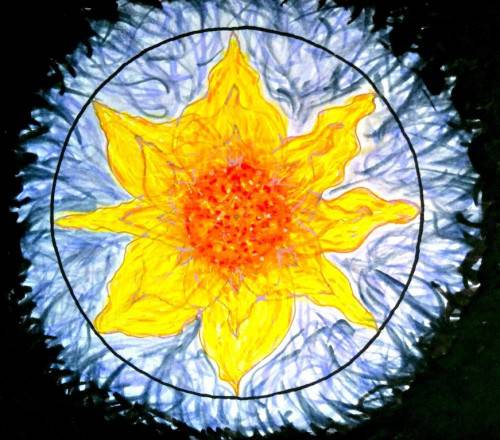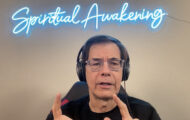Clouds Block Sun View
Happy Wednesday!
I’m having a great day! I hope you are too 🙂
Today I’m working on creating a water-charger for one of my clients. It’s quite a project so I’ll share more about that tomorrow.
Please enjoy my Tao-Te-zen sutra: Clouds Block Sun View
Clouds block sun view only to the eyes
Elements emergent
Spirits disguise
Warm is the sunshine
Wet is the rain
Clouds are essential for in them
One becomes the other again and again.
TAO-TE-zen practice is one of appreciating
Witnessing Spirit’s play of elements
Zen sees and knows that all
But unconditional love is transient
Pain can never last long
That love needs the other.
Zen in practice is
As a wise mother who loves holding
Yet loves letting go
That is zen.
Clouds here are a double metaphor. They are a metaphor for the transformation of elements. The sun warms the clouds and converts them into something more atmospheric, something less dense.
The clouds indicate low pressure. The sun and its warmth elevates pressure. Clouds represent a collection of something blocking our sun-view; they represent emotional weight, mental weight, depressiveness, heaviness, darkness.
Sun in this regard may be thought of as joy, or enlivening, enlightening, light, vision, clarity, perception.
“Clouds Block Sun View” as a Sutra is indicating that just as the sun can transform the clouds into atmosphere, it can burn a hole in them and create a beautiful combination out of the shades of light and dark, warmth and coolness.
We can transform our personal clouds into sunshine by realizing that all clouds metaphorically are transient experiences and that the sun represents joy and clarity of life. The sun is always there even though clouds may block the view of the sun.
Everything is energy. Everything is alive! Spirit disguises itself in creation the same way the divine disguises itself in an ego, which is in a perpetual state of transformation.
Warm is the sunshine, yang. Wet is the rain, yin. “Clouds are essential for in them one becomes the other again and again.” It means that water becomes atmosphere; atmosphere becomes water which is a changing of the elements again and again.
It means everything cycles, our bodies will be ashes or dust once again.
“TAO-TE-zen practice is one of appreciating, witnessing Spirit’s play of elements. Zen sees and knows that all but unconditional love is transient. Pain can never last long. That love depends on the other.”
So here we have a combination of points of awareness. “TAO-TE-zen practice is one of appreciating, witnessing Spirit’s play of elements.”
Once one comes to understand that All IS One, then there is no longer a search for that which people refer to as God, or a Buddhist refers to as the ground of being, or zen refers to as no mind.
One comes to realize the truth of creation itself and instead of trying to fix it or criticize it, one who practices TAO-TE-zen learns to appreciate and witness Spirit’s play of elements.
“Zen sees and knows that all but unconditional love is transient.” Unconditional love, silence, neither of those is transient.
To be transient is a condition itself, therefore as often used in metaphysics the sun can be a great example of unconditional love. Even though it appears to be nighttime to you, the sun is always shining and sharing its love unconditionally with all.
Love is the truth; therefore “pain can never last long. That love needs the other.” Pain cannot be perceived as pain unless one has knowledge of the other, that which is not pain.
Therefore, pain and love, or pain and happiness need each other.
They become the other, just like the clouds become rain only to vaporize into atmosphere or to convert themselves into life as plants, animals, and human beings – all of which depend on water or rain from the clouds.
We finish our Sutra practice with “Zen in practice is as a wise mother who loves holding yet loves letting go.”
The wise mother loves holding her family together and her children, yet the wise mother also loves letting them go to play, to grow, to learn, to become—not to over-control or stifle with excessive love or lack of love.
We conclude with “That is zen”, zen meaning the most efficient way. So our Sutra practice is really one that invites us to watch, to witness the transformation of the elements around and within us.
All things new become old, that which was shiny becomes tarnished, that which was strong becomes weak. You buy a new tent, and sooner rather than later it seems that the tent has holes in it and zippers don’t work, it’s hard to fold.
These things signify the transient nature of all things created. Zen witnesses but does not get caught up.
One of zen does not fear aging. One of zen invites aging as an opportunity to witness the natural transformation that is part and parcel of all things created and all things living.
I invite you to witness, to observe, to enjoy, and to remember that the clouds in your life are transient and the sun will burn through if your invite it. Unconditional love is always there.
Pain is transient, and joy is transient to the one who rises above the balance of joy and the balance of the natural rhythm and flow of life.
If one goes too high, they end up reciprocally coming down proportionally low. When that is brought to an extreme, it is referred to as mania followed by depression or a bipolar situation.
The pendulum swings widely and one goes for quite a roller coaster ride, which leads to stress, because eventually one becomes suspicious that their joy is going to lead to pain and wonders if their pain will ever lead to joy. That in turn leads one into quite a challenge with their mind.
Zen is like surfing, you can turn left and you can turn right, you can lean forward and you can lean backward, you can hang your toes over the board, you can do tricks, yet all those things require balance for the surfer.
Zen is the art and practice of surfing life.
Love and chi,
Paul Chek















Find me on the web